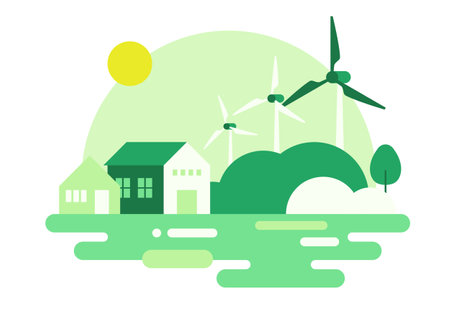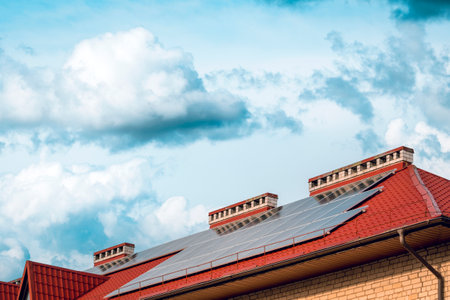Introduction to Renewable Energy Communities in the UK
Across the United Kingdom, renewable energy communities are rapidly emerging as a practical and sustainable response to climate change and rising energy costs. These community-led initiatives bring together local residents, businesses, and organisations to collectively generate, manage, and share renewable energy resources—most notably through solar panel schemes. The concept goes beyond individual households installing panels on their roofs; it is about pooling resources and expertise for mutual benefit. This collaborative approach not only makes clean energy more accessible but also empowers communities to take control of their own energy futures. As the UK government continues to promote net zero targets and energy independence, shared solar schemes and local energy trading are gaining momentum, providing both environmental benefits and cost savings. By setting the stage for innovative solutions such as peer-to-peer energy trading, these communities are helping to reshape the national energy landscape while fostering a sense of local resilience and collective responsibility.
Shared Solar Panel Initiatives
Shared solar panel schemes have emerged as a practical solution for communities in the UK looking to embrace renewable energy without the need for individual households to install their own panels. These initiatives allow groups of residents, businesses, or local organisations to jointly invest in and benefit from solar installations, typically located on public buildings, community centres, or apartment blocks. By pooling resources and sharing the output, participants enjoy reduced electricity bills and a lower carbon footprint.
How Do Shared Solar Schemes Work?
The core idea behind shared solar is collective ownership or access. Residents either buy a share in a large solar installation or pay a subscription fee to use the generated electricity. The generated power is either distributed directly to participants through private wire arrangements or supplied to the grid with financial returns shared among stakeholders. This model overcomes barriers such as lack of roof space, unsuitable property orientation, or upfront costs that can prevent individuals from adopting solar technology independently.
Examples of Successful UK Projects
| Project Name | Location | Key Features |
|---|---|---|
| Brixton Energy Solar 1 | London | Community-owned project installing panels on council estates; profits fund local sustainability initiatives. |
| Bath & West Community Energy (BWCE) | Somerset and Wiltshire | Large-scale installations on schools and community buildings; offers shares to local residents. |
| Moss Side Community Solar Project | Manchester | Solar panels installed on social housing; aims to reduce fuel poverty and empower residents. |
Getting Involved: Steps for Local Residents
- Research Local Projects: Check with your local council or community energy groups for ongoing schemes.
- Attend Information Sessions: Many projects hold open meetings or webinars to explain participation options.
- Invest or Subscribe: Depending on the scheme, you may be able to purchase shares or sign up as a member.
- Benefit from Savings: Enjoy lower energy bills and sometimes dividends from surplus electricity sales.
- Engage in Governance: Many initiatives encourage members to take part in decision-making processes.
The growth of shared solar panel projects across the UK demonstrates how communities can work together towards a greener future, breaking down financial and technical barriers while fostering local pride and resilience.

3. Local Energy Trading: How It Works
Local energy trading is transforming the way communities in the UK generate, share, and consume renewable energy. This innovative approach allows residents who participate in shared solar panel schemes to buy and sell electricity with their neighbours, creating a more efficient and sustainable local energy ecosystem.
Peer-to-Peer Trading Platforms
At the heart of local energy trading are peer-to-peer (P2P) trading platforms. These digital platforms connect households within renewable energy communities, allowing members to set their own prices and trade surplus electricity generated from solar panels directly with others nearby. This system removes the need for traditional middlemen and gives community members greater control over where their energy comes from and how its used. In the UK, several pilot projects have already demonstrated how P2P platforms can help balance supply and demand locally while encouraging greener habits.
The Role of Smart Meter Technology
Smart meters play a crucial role in enabling local energy trading. By providing real-time data on household energy production and consumption, smart meters ensure that trades between neighbours are accurate and transparent. The technology also supports dynamic pricing, so community members can benefit from lower costs during periods of high solar generation or increased demand. The rollout of smart meters across the UK is making it easier for more homes to participate in these schemes.
Practical Steps for Community Members
Getting involved in local energy trading is becoming increasingly straightforward for UK residents. Most schemes start with a shared solar installation managed by a cooperative or community group. Interested households then register on a P2P platform and connect their smart meters. From there, they can monitor their usage, set preferences, and trade energy as needed—all via user-friendly online dashboards or mobile apps.
The Benefits for Everyday Life
For families and individuals, local energy trading means potentially lower bills, reduced carbon footprints, and stronger community ties. By working together to manage supply and demand locally, communities can make the most of their shared renewable resources while supporting national efforts to reach net-zero targets.
Benefits for Households and the Community
Renewable energy communities are rapidly becoming a practical solution for UK households seeking to lower their carbon footprint while enjoying tangible everyday benefits. By participating in shared solar panel schemes and local energy trading initiatives, residents can tap into a range of economic, environmental, and social advantages that make a real difference in daily life.
Everyday Economic Advantages
One of the most immediate perks is the potential for reduced energy bills. When households generate electricity collectively through shared solar panels, they can access cheaper, locally produced power. Energy trading platforms allow members to buy and sell surplus electricity within their community at competitive rates, making it possible to avoid higher tariffs from traditional suppliers.
| Benefit | Description |
|---|---|
| Lower Electricity Bills | Shared generation and trading help households access affordable local power. |
| Revenue from Surplus Energy | Members can earn by selling excess electricity back to the community or grid. |
| Reduced Grid Reliance | Local production lessens dependency on national energy markets and price fluctuations. |
Environmental Gains
The switch to renewable sources such as solar power significantly reduces carbon emissions across entire neighbourhoods. Shared schemes maximise the use of available rooftop space, increasing green energy output and minimising wasted potential. This collective approach accelerates the shift towards net zero targets in line with UK climate goals.
Social and Community Resilience
Beyond financial and environmental gains, these schemes foster stronger social connections. Working together on energy projects builds trust and encourages knowledge sharing among neighbours. Communities become more resilient during supply interruptions or price spikes, as they can rely on locally stored or generated power. Vulnerable households especially benefit from fairer access to clean energy, reducing fuel poverty risks.
Summary Table: Key Benefits for Households and Communities
| Economic | Environmental | Social |
|---|---|---|
| Reduced bills Extra income from surplus sales |
Lower CO2 emissions Efficient use of local resources |
Greater community cohesion Enhanced local resilience |
The move towards renewable energy communities is not just about technology; its about creating lasting value for people and neighbourhoods across the UK, making everyday living greener, safer, and more affordable.
5. Policy Support and Local Government Involvement
Policy support is a cornerstone for the growth of renewable energy communities across the UK, especially when it comes to shared solar panel schemes and local energy trading. National policies such as the Smart Export Guarantee (SEG) and earlier Feed-in Tariffs have provided incentives for individuals and groups to generate their own clean energy. The UK government’s commitment to reaching net zero by 2050 has further encouraged community-led renewable initiatives, with several funding streams and regulatory frameworks tailored to empower local action.
Councils and local authorities play a pivotal role in making these projects feasible and sustainable. They are often responsible for granting permissions, providing access to suitable public land or buildings, and sometimes offering financial or administrative support. Many councils actively collaborate with community groups, helping them navigate planning processes or connecting them with partner organisations and funding opportunities. For example, some local authorities facilitate bulk-buying schemes for solar panels or act as intermediaries in setting up local energy trading platforms.
Additionally, local governments are increasingly integrating renewable energy communities into their broader sustainability strategies. This includes embedding community energy targets within Local Plans, supporting pilot projects in council-owned housing estates, or developing frameworks that encourage citizen participation in energy decision-making. Such involvement not only accelerates the adoption of renewables but also ensures that benefits—like reduced bills and strengthened local economies—are felt close to home.
The policy landscape is still evolving, with ongoing consultations about how best to simplify regulations and offer stable long-term support. As councils gain more autonomy through devolution deals and city-region powers, their influence over local energy systems is set to grow even further. Ultimately, effective policy backing at both national and local levels remains essential for unlocking the full potential of renewable energy communities throughout the UK.
6. Practical Considerations and Safety Measures
Keeping Your Community Solar Scheme Running Smoothly
Ensuring the long-term success of a shared solar panel scheme in a UK renewable energy community involves more than just installation. Regular maintenance, safety checks, and efficient operation are crucial to deliver ongoing benefits and reliability to all members.
Routine Maintenance: The Key to Efficiency
Solar panels generally require minimal maintenance, but an annual inspection is essential. This should include cleaning panels to remove debris, leaves, or bird droppings, which can reduce efficiency. For rooftop installations, it’s best to hire professionals for safe access and cleaning. Ground-mounted arrays may need periodic vegetation management to prevent shading.
Safety First: Electrical and Structural Checks
All electrical systems must comply with UK regulations such as BS 7671 (IET Wiring Regulations). Arrange for a qualified electrician to perform regular checks on wiring, inverters, and connections. Inspect mounting structures for corrosion or weather damage, particularly after storms. Always ensure only certified contractors work on the system to maintain warranties and insurance cover.
Energy Monitoring and Sharing Arrangements
Install smart meters or energy management systems to monitor generation and consumption within the community. Transparent reporting builds trust and helps identify any underperformance early on. Establish clear rules for local energy trading – whether through peer-to-peer platforms or cooperative agreements – to keep things fair and straightforward.
Emergency Procedures and Insurance
Create a clear emergency response plan covering incidents like electrical faults or fires. All participants should know how to safely isolate the system if required. Comprehensive insurance is a must—ensure your policy covers accidental damage, theft, liability, and loss of income from downtime.
Promoting Community Engagement
Regular meetings or updates help keep everyone informed about system performance, scheduled maintenance, and any issues encountered. Training sessions on basic solar safety awareness empower residents to spot potential problems early.
Long-Term Reliability: Planning Ahead
Factor in the eventual replacement of key components such as inverters (typically every 10-15 years) when budgeting for your scheme. Set aside a community fund for unexpected repairs or upgrades, ensuring financial sustainability well into the future.
By following these practical tips and prioritising safety, UK renewable energy communities can enjoy cleaner power, lower bills, and greater resilience—making shared solar schemes a reliable investment for years to come.
7. The Future of Energy Sharing in the UK
As Britain continues its journey towards net zero, the future of energy sharing is set to become even more dynamic and community-focused. New technologies such as smart meters, blockchain-powered trading platforms, and advanced battery storage are empowering local residents to generate, store, and exchange renewable electricity with greater efficiency and transparency than ever before. These innovations are transforming the traditional role of energy consumers into proactive “prosumers”, who both produce and consume locally-generated green power.
In the coming years, we can expect to see renewable energy communities play an increasingly pivotal role in shaping the UKs decentralised energy landscape. Shared solar panel schemes will likely expand beyond residential rooftops to include schools, businesses, and public spaces—maximising clean energy generation at every opportunity. As regulations evolve to support peer-to-peer energy trading, neighbourhoods will be able to buy and sell excess electricity in real time, keeping energy bills down while strengthening local resilience.
Emerging trends also point toward greater integration of electric vehicles (EVs) within community energy systems. Vehicle-to-grid technology could allow EV owners to contribute stored power back to their local network during peak demand periods, creating a circular flow of clean energy throughout towns and villages.
The growth of these collaborative initiatives not only accelerates Britains transition away from fossil fuels but also fosters social cohesion by encouraging residents to work together for a sustainable future. As more people join renewable energy communities, collective bargaining power increases, enabling access to better tariffs and funding opportunities for further green upgrades.
Ultimately, the evolution of shared solar schemes and local energy trading signals a cultural shift—one where British households take pride in powering their homes and neighbourhoods with locally-sourced renewables. By embracing innovation and community spirit, the UK is well-placed to lead Europe in building a fairer, cleaner energy system for generations to come.


